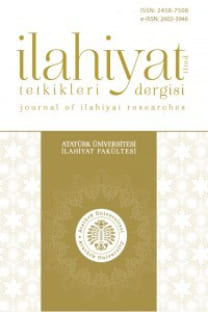Jules Simon’da Tanrı’nın Kavranılamazlığının Felsefi Savunusu
din felsefesi, Jules Simon, Tanrı, Sonsuzluk, Kavranılamazlık
The Philosophical Argument of God's Incomprehensibility in Jules Simon
Philosophy of Religion, Jules Simon, God, Eternity, Incomprehensibility,
___
- Arıcan, M. Kazım. “Panteizm ve Panenteizm Tartışmaları Arasında Spinoza”. Beytulhikme An International Journal of Philosophy 3/1 (2013), 17-32.
- Arıcan, M. Kazım. “Spinoza’nın Tanrı Anlayışının Din Felsefesi Açısından Değerlendirilmesi”. Cumhuriyet Üniversitesi İlahiyat Fakültesi Dergisi XI/1 (2007), 173-206.
- Aristoteles. Die Metaphysik Des Aristoteles. Tübingen: Fues, 1847.
- Bossuet, Jacques Benigne. Élévations à Dieu sur tous les mystères de la religion chrétienne. Paris: Libraire Editeur, 1842.
- Descartes, Rene. Discours de la méthode pour bien conduire sa raison, & chercher la verité dans les sciences. Paris: Librairie de la Bibliothèque Nationale, 1894.
- Descartes, Rene. İlk Felsefe Üzerine Metafizik Düşünceler. İstanbul: Milli Eğitim Bakanlığı Yayınları, 1998.
- Descartes, Rene. Les méditations métaphysiques. 2 Cilt. Paris: Chez Pierre Prault, 1724.
- Descartes, Rene. Oeuvres de Descartes: Principes de la philosophie par Charles Adam & Paul Tannery. Paris: Librairie Philosophique, 1964.
- Descartes, Rene. Principes de la philosophie. Paris: Librairie Hachette, 1892.
- Devillairs, Laurence. “L’Augustinisme des Preuves Cartésiennes de l’Existence de Dieu”. Archives de Philosophie 67/1 (2004), 23-50. https://doi.org/10.3917/aphi.671.0023
- İbn Sînâ. Aşk Risalesi. çev. Ahmet Ataş. İstanbul: Kırkambar Kitaplığı, 2002.
- Jacques, Amedee vd. Manuel de philosophie. Paris: Librarie de L. Hachette, 4. Basım, 1863.
- Korlaelçi, Murtaza. “Deizm – Ateizm Tartışmaları ve Günümüze Yansımaları”. Felsefe Dünyası 68 (2018), 5-23.
- Leibniz, Gottfried Wilhelm. Monadoloji: Metafizik Üzerine Konuşma. çev. Atakan Altınörs. İstanbul: Doğubatı, 2011.
- Leibniz, Gottfried Wilhelm. Nouveaux essais sur l’entendement humain. 2 Cilt. Paris: Librairie Ernest Flammarion, ts.
- Özalp, Hasan. “Descartes Felsefesinde Kozmolojik Argüman Soruşturması”. Milel ve Nihal 11/2 (2014), 139-161.
- Poitou, M. Eugene. Les philosophes Français contemporains et leurs systèmes religiuex. Paris: Libraire Editeur, 1864.
- Seche, Leon. Jules Simon sa vie et son oeuvre. Paris: A. Dupret Éditeur, 1887.
- Simon, Jules. Études sur la théodicée de Platon et d’Aristote. Paris: Libraire Editeur, 1840.
- Simon, Jules. Histoire de l’école d’Alexandrie. Paris: Libraire Editeur, 1845.
- Simon, Jules. La liberté. 6 Cilt. Paris: Librairie de L. Hachette, 1859.
- Simon, Jules. La liberté de conscience. Paris: Librairie Hachette, 5. Basım, 1872.
- Simon, Jules. La religion naturelle. Paris: Librairie de L. Hachette, 4. Basım, 1857.
- Simon, Jules. Le devoir. Paris: Librairie Hachette, 11. Basım, 1874.
- Spinoza, Benedictus de. Etika. çev. Hilmi Ziya Ülken. Ankara: Dost Kitabevi, 4. Basım, 2011.
- Wisnovsky, Robert. İbn Sînâ Metafiziği. çev. İbrahim Halil Üçer. İstanbul: Klasik, 2010.
- ISSN: 2458-7508
- Yayın Aralığı: 2
- Başlangıç: 1975
- Yayıncı: Atatürk Üniversitesi
Covid-19 Nedeniyle Yakınlarını Kaybeden Bireylerde Yas Süreci ve Dini Başa Çıkma
Gazzâlî’de Ruhun Tabiatı Tartışması: Maddi mi Gayri Maddi mi?
Bir Beceri Olarak Ahlak ve Eğitimi: Ahlaki Gelişim Kuramlarına Dayalı Bir İnceleme
Cerh-Ta’dîl’e Karşı Gıybet Eleştirisinin Tarihî Süreci
Fıkıh Usûlü Geleneğinde Cüveynî’nin Te’vil Anlayışı
Müslüman Yaşlılarda Pandemi Sürecine İlişkin Ruhsal Etkilenimler ve Dini Düşünceler
II. Meşrûtiyet Dönemi Osmanlı İslamcı Basınında Salgın Hastalık Tedbirleri
